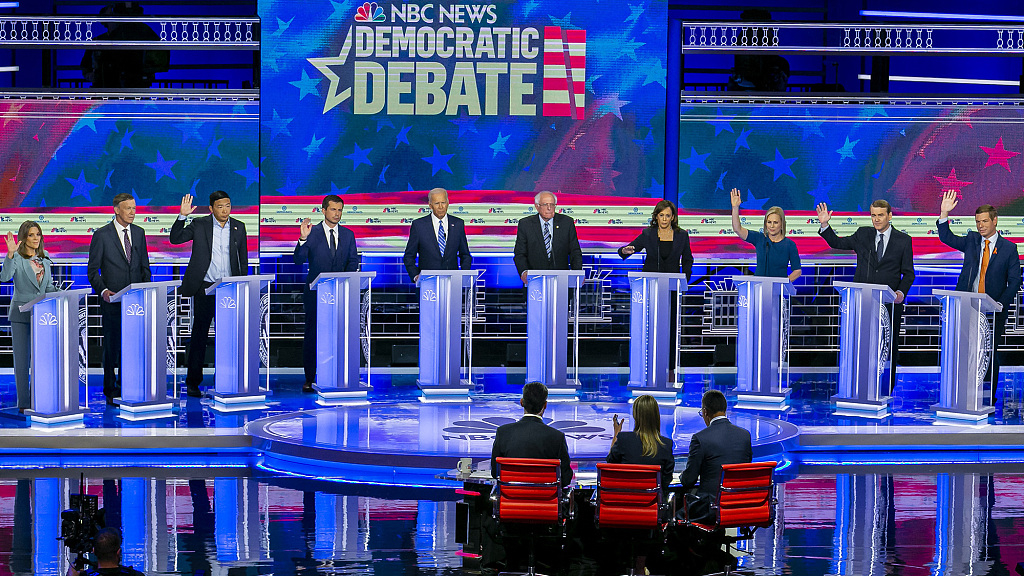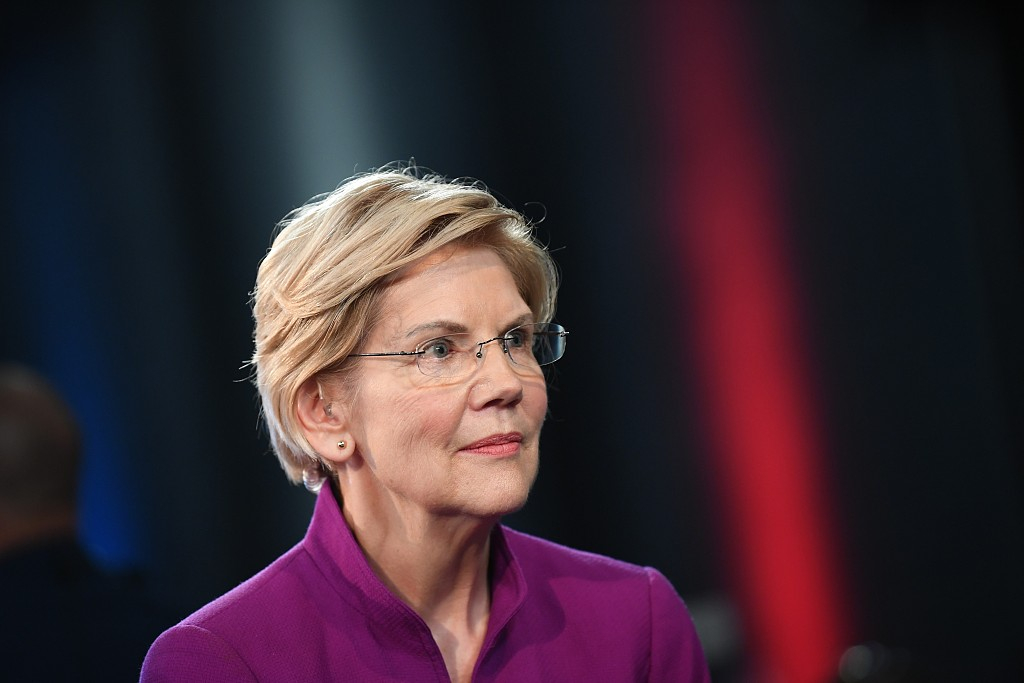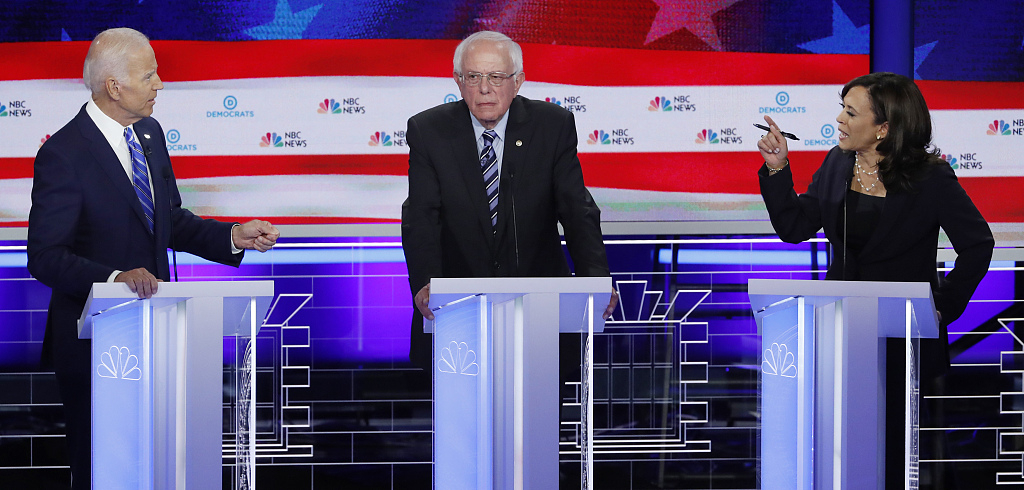

Editor's note: Elizabeth Drew is a Washington-based journalist and the author of Washington Journal: Reporting Watergate and Richard Nixon's Downfall. The article reflects the author's opinion, and not necessarily the views of CGTN.
The unprecedentedly large number of candidates – 25 at last count – for the Democratic nomination to take on U.S. President Donald Trump in 2020 has led to an awkward opening to the contest. The number of contenders will drop as the qualifications for participating in party debates tighten (especially in September) and some run out of money. Some know they have no real chance at winning, but hope that becoming better known might land them a cabinet post, more lucrative book deals, or larger speaking fees.
Most experienced political observers have assumed that the Democrats can defeat Trump unless they swing too far to the left, turning off those who had supported Barack Obama and then Trump, including the blue-collar workers and suburbanites who decided the 2016 election. There were various moments in both debates when one could envision Trump smiling. And now many Democrats are depressed.
The problem for the Democrats, especially in this election cycle, is that voters in primary contests (in both parties) tend to be more extreme than the parties as a whole. The Democrats' recent swing to the left began with the 2016 challenge by Bernie Sanders – who calls himself a "democratic socialist" and isn't a Democratic Party member – to Hillary Clinton's presumed nomination. Sanders, with his appeal as an insurgent and his unrealistic promises (as well as Clinton's weaknesses) nearly undid her nomination. Young people in particular found him an exciting anti-establishment figure.
Senator Elizabeth Warren was rising in the polls even before the debates. But her vast policy agenda represents a leap forward in government intervention in the economy and other domestic arrangements; adds up to trillions of dollars, without a clear explanation of how to pay for it; and is unlikely to be approved by Congress (even if the Democrats recapture control of the Senate). None of this has caught up with her, but as she becomes one of the top two or three candidates (drawing some support from Sanders), these vulnerabilities are likely to be exposed.

Senator Elizabeth Warren speaking to reporters in Miami, Florida, U.S., June 26, 2019. /VCG Photo
Kamala Harris, born of professional parents from Jamaica and India, is more cautious than Warren and in some cases her positions – for example, on whether private health insurance should be abolished – have been contradictory. She built her reputation on having been a prosecutor and attorney general in California, and has won national attention by using her prosecutorial skill in hearings, though not always fairly. As a California prosecutor she was partly progressive, but also demanded harsh sentences and reportedly kept some innocent people locked up.
In the second of the first pair of Democratic debates, Harris stole the show by attacking former vice president Joe Biden, at that point the front-runner. Dredging up a controversy from the 1970s, Harris pointed out that the former senator from Delaware had opposed federally mandated busing in order to achieve greater racial integration of schools. A Gallup poll in the early 1970s found that only four percent of whites and nine percent of African-Americans supported the highly controversial program.
Harris, who pointed out that as a child she participated in a busing program (albeit a voluntary one in Berkeley, California), combined that attack with a declaration of personal hurt from Biden's recent unartful nostalgic recollection of working with two arch-segregationists in the Senate to get some bills passed decades ago. Both occupied powerful Senate positions and pro-civil rights Democrats working with them wasn't uncommon, though Biden could have chosen less noxious examples to make his point.
Harris sought to cut into Biden's strong African-American support, which has been aided by his eight years as vice president to Barack Obama. Biden was unprepared for the attack and stumbled in his reply. He emphasized his strong pro-civil rights record, and a couple of weeks later he apologized for appearing to condone the two segregationist senators. And it turned out that Harris's current position on busing isn't much different from Biden's. But her attack was enough to catapult her nearly to the top of the polls. The press attention afterward to Harris's long-planned attack on Biden – confrontations and zingers (though obviously rehearsed) make for good TV – is an example of what's wrong with these "debates" as a vehicle for choosing a candidate.

Former U.S. vice president Joe Biden (L), Senator Kamala Harris (R), along with Senator Bernie Sanders (C) during the second Democratic Party debate in Miami, Florida, U.S., June 27, 2019. /VCG Photo
Sanders's considerable recent decline in opinion polls – coming in behind Harris and Warren in some polls, as well as behind Biden – can be attributed to the fact that his act is no longer fresh. He's still long on promises and short on details, and he's still grumpy and a yeller. But, mainly, Sanders is no longer the lone insurgent challenging the quintessentially establishment figure.
Biden, however, has the greatest problems. Before the first debates, he hovered some 20 points above his rivals. Though this may have been due largely to his greater name recognition and his evident closeness with Obama (who is remaining studiously neutral), he has come across as dwelling in nostalgia. He seems not to recognize how much U.S. politics has changed in terms of hyper-partisanship since he was in the Senate, before the Republican Party turned to the right and became openly obstructionist.
Moreover, Biden was never a great campaigner for the presidency, failing twice. He'll be 77 in November (three years older than Trump) and would turn 80 in his first term – making him the oldest U.S. president ever.
Two or three others remain plausible Democratic candidates. Right now, some of the charm might be wearing off Pete Buttigieg, the preternaturally wise 37-year-old mayor of South Bend, Indiana, a gay man who volunteered to serve in Afghanistan.
"Mayor Pete" had an excellent spring, and he remains a darling of many Democratic donors. But just before the debate, he had to confront an issue vexing officials in towns and cities across the country: a white policeman in South Bend had recently shot and killed an unarmed black man. In the debate, the issue seemed to weigh him down. And he's in trouble if he can't attract African-American support, a problem he's had ever since, as a new mayor, he fired South Bend's first black police chief.
By the conclusion of the first pair of debates, many of the Democratic candidates had backed controversial leftist proposals such as Medicare for All, which could spell the end of private health insurance and raise taxes; decriminalizing undocumented immigration; covering undocumented immigrants in government health-care plans; and school busing.
A major dilemma of the Democratic nomination contest is that it is a test of two important attributes: which candidate can beat Trump, and which is offering the most appealing platform to primary voters. These are not the same thing.
Copyright: Project Syndicate, 2019.
(If you want to contribute and have specific expertise, please contact us at opinions@cgtn.com.)

Copyright © 2018 CGTN. Beijing ICP prepared NO.16065310-3
Copyright © 2018 CGTN. Beijing ICP prepared NO.16065310-3